The Battle Is On To Salvage The Season In Bilbao!
Manchester United and Tottenham Hotspur will meet in an all-English Europa League final on 21st May for a chance to play in the Champions League...
Good afternoon and welcome back to The Overlap Newsletter! It will be an all-English Europa League final on 21st May as both Manchester United and Tottenham Hotspur will be hoping to salvage something from their poor domestic seasons. Tottenham (who are currently 16th in the league) will be looking to end a 41-year wait for European success and to win a first trophy of any kind in seventeen years. Manchester United (currently 15th in the league) who will contest their 9th European final in Bilbao, will be hoping to win the Europa League for the second time in eight years, with a spot in the Champions League up for grabs! If both teams reach the Europa League final and stay in their current Premier League positions, the winner would be the lowest-ranked domestic side to win the competition in the past 15 years. The final also gives Manchester United a chance of securing a 45th major trophy, closing the gap to Liverpool’s lead as the most successful English club (47 trophies). Take our poll below and let us know who you think will win the Europa League:
Catch the latest episode of Stick To Football on The Overlap Youtube Channel as Gary Neville, Roy Keane, Jill Scott, Ian Wright and Paul Scholes discuss Arsenal’s Champions League campaign, Manchester United’s Europa League hopes and Trent Alexander-Arnold’s departure from Liverpool. Listen to the latest episode of It Was What It Was following the link below as Jonathan Wilson and Rob Draper look back on the rich history of Goodison Park, Everton's storied home ground, as it approaches its final days:
Quiz Question…
In November, Arne Slot became only the third manager to win 10 of his first 12 Premier League matches. Who were the other two?
Answer to follow at the end of the Newsletter…
Stick To Football Behind The Scenes:
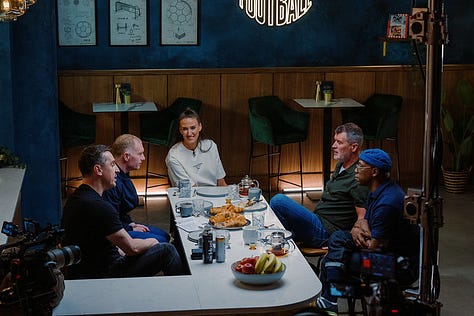
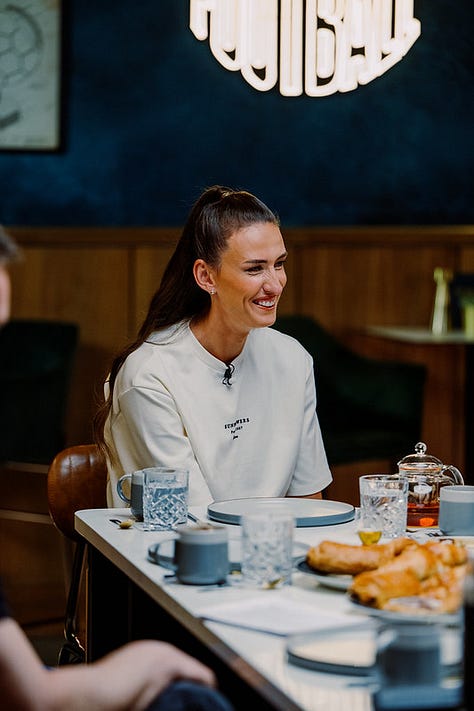
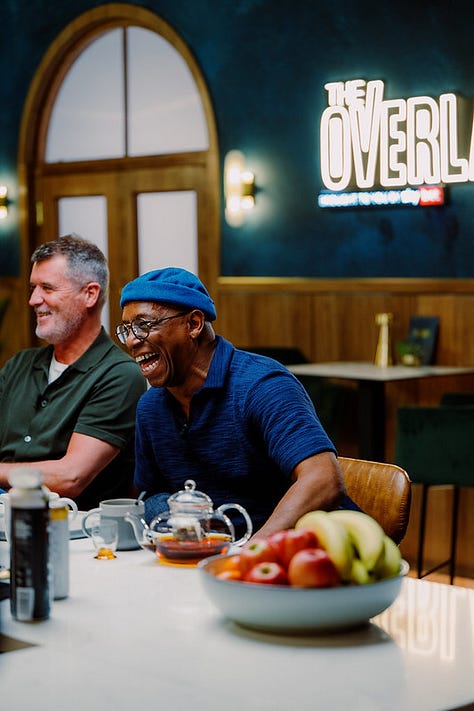
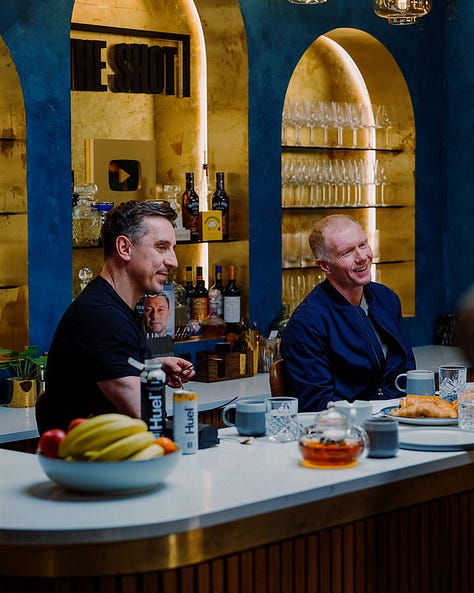
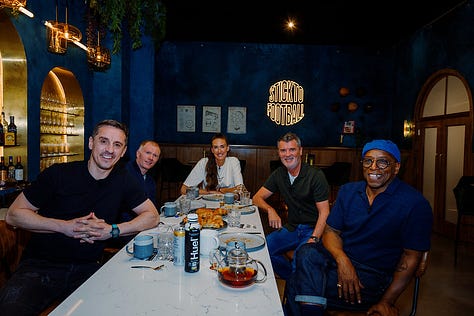
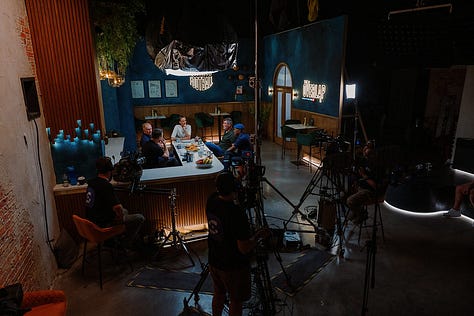
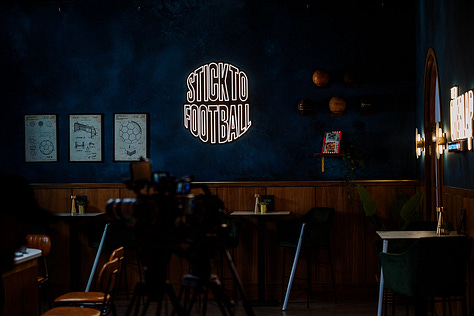
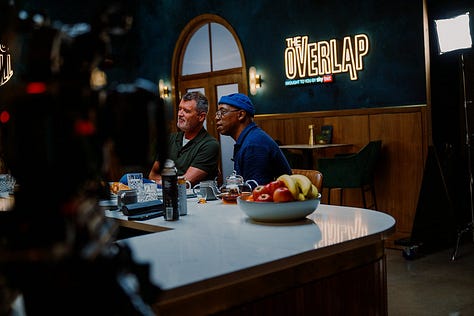
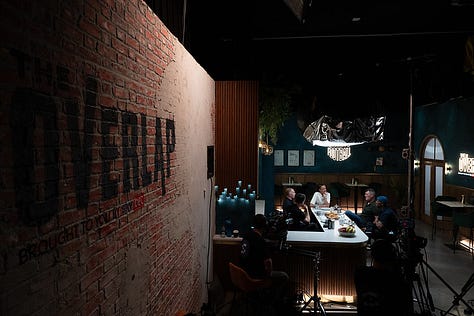
BILBAO IS LAST-CHANCE SALOON TO SAVE THE SEASON
By Rob Draper, co-host It Was What It Was
So we’re all off to Bilbao for primary school sports day on 21st May where one of the worst-performing sides in the Premier League gets to be a winner and everyone receives a medal. Essentially this is what Super League plotters, Manchester United and Tottenham amongst them, wanted when they tried to rid themselves of a competitive process to qualify for the Champions League.
And yet, in reality, the Europa League is a venerable old competition, its roots going back to the old Fairs’ Cup which started in 1958, had Barcelona as inaugural winners and was a series of friendlies designed to promote trade fairs in major European cities. It sat alongside the founding of the European Economic Community (forerunner of the European Union) in 1957 and the advent of the European Cup in 1955 as another project to bring the continent together in the wake of the Second World War.
When it evolved into the UEFA Cup in 1971-72, the first winners were Tottenham and - omen alert - their victory came in an all-English final against Wolves. The tournament was just getting going at that stage but when Tottenham won it in 1983-84, it was at its peak. Those were the days when only one team qualified for the European Cup/Champions League and so the old UEFA Cup had depth and quality not dissimilar to a modern Champions League, often featuring four of the best sides in Spain, England, Italy and Germany. Admittedly Spurs did win their first round tie 14-0 against Drogheda United in 1984. But their path to the final was Feyenoord, Bayern Munich, Austria Memphis and Hajduk Split (back when Eastern European players stayed in domestic leagues), with Anderlecht in the final. The other English teams in the UEFA Cup that year were an extraordinary Watford side under Graham Taylor, who had come second in the league, Nottingham Forest, who had won the European Cup in 1979 and 1980 and Aston Villa, who had won it in 1982.
The evolution of the Champions League to feature four teams from the top leagues (and next season England will have six clubs in Europe’s premier tournament) greatly diminished the grand old trophy. Clubs such as Sevilla, who made it their own with seven victories since 2006, have used it as a vitally-important staging post for their club, yet Manchester United should really be above such things, even if they are strictly a second division club these days in European terms.. They have barely featured as a serious competitor in the Champions League since they made the final in 2011.
Indeed, it’s been hard at times to take the competition as seriously as you might have done in 1984 when Tottenham (annual turnover £528m) vanquished Bodø Glimt (annual turnover £45m) in the semi-finals and Manchester United (£662m annual turnover ) beat Athletic (£116m annual turnover). Those financial figures are more commensurate with an FA Cup tie against a lower-league club than something you would expect at the elite end of a well-balanced European competition. It is noticeable that when Premier League teams go toe-to-toe with clubs of comparable finances, they fare less. PSG, annual turnover £681m, were conquerors of Manchester City, Liverpool, Aston Villa and Arsenal. “We are the league of farmers, no?” said Luis Enrique, glint in eye, tongue in cheek and smiling broadly when quizzed by English TV after his semi-final win.
With the expansion of the Champions League this season, which was a direct consequence of the Super League plot, the Europa League has been further diminished. Simultaneously the evolution of the Premier League into a Big Six and, arguably, now a Big Seven, means that there will always be an overpowered English team in the Europa League. Even if the Premier League can’t dominate the best clubs in Europe, their financial power definitely runs far deeper than any rival league.
And yet, for all that, Bilbao will be a great occasion. It isn’t just that it’s an extraordinary city, with great food, hospitality and a deep football culture hugely connected to England - and for more on that listen to our episode on the Rise of The Basques:
Even if it is seen as a consolation prize, the trophy would be hugely significant for both clubs. Ruben Amorim is clearly a young coach with considerable talent stuck at a dysfunctional, broken institution, a vortex of failure which sucks in all who venture near it. And yet perhaps in their nadir, Manchester United can extract something like Sir Alex Ferguson’s 1990 FA Cup win, a springboard to rebuild a decent team.
For Spurs, winning a European trophy of this stature would be an enormous feat, resonant with Bill Nicholson’s achievement of leading the club to be the first English team to win a European trophy, the 1963 European Cup-Winners’ Cup. Tottenham may have hauled their way into the Big Six financially, but they are miles behind their colleagues on trophy counts. As my co-host Jonathan Wilson often points out, they have as many league titles as Preston, Portsmouth, Derby and Burnley. And less than Sunderland, Huddersfield, Sheffield Wednesday, Blackburn and Wolves. And the two they won were in black and white.
They are all mouth and no trousers as a football club, the image far outweighing reality. They are the club that brought out a range of merchandise to celebrate reaching the Carabao Cup final in 2021. Whose chairman Daniel Levy presented the players with commemorative watches for reaching the 2019 Champions League final, an act of such small-time mentality it left World Cup winner Hugo Lloris aghast and questioning his future at the club.
This season Ange Postecoglou has played a risky high line on the pitch and his pledge of always winning a trophy in his second season seemed a similarly hazardous approach. And yet here he is, one game from glory. For a club without a trophy in 17 years, it is a huge opportunity. Postecoglou is right: it doesn't really matter where the respective clubs sit in the Premier League table. Nor does it matter whether it feels like the losers’ plate final. There is still some life left in the old UEFA Cup and whether it is Bruno Fernandes or Son Heung-min holding it aloft in Bilbao, it will invest that fine trophy with fresh meaning. If it is Spurs who are victorious, they might even like to consider a fresh line of merchandise, this time with a novel winners theme.
Quiz Answer:
Carlo Ancelotti and Guus Hiddink




Not bad for Spurs to make the final with an annual turnover of just £528